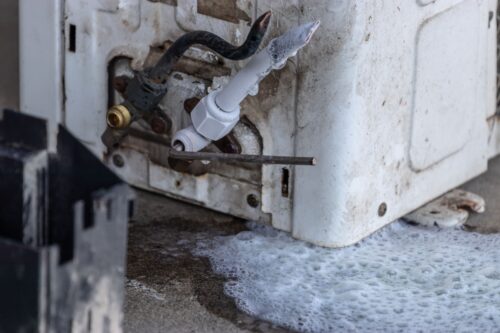The refrigeration industry is taking an important step forward in its evolution by phasing out HFCs. HFCs are being phased out because they contribute to climate change and pose a significant environmental threat. Said HFCs can be found in common-use commercial products, like refrigerant.
Refrigerant leaks are one of the biggest concerns for industrial refrigeration systems. In many industries, companies are looking to find solutions that will help them comply with HFC regulations and make their systems more environmentally friendly.
To save money and promote a greener workplace, here’s how businesses can mitigate risk and combat refrigerant leaks amidst HFC regulations.
What Causes Refrigerant Leaks?
Refrigerants are usually fluids that, in simplest terms, cool down an environment. However, certain refrigerants such as R22 are being phased out due to its high Global Warming Potential (GWP). Before we dive into solutions for refrigerant leaks, we must first understand why and how they occur.
Refrigerants can leak for several reasons, including poor HVAC system installation, eroding parts, or general wear and tear over time. You can spot a potential refrigerant leak when rooms are either being improperly heated or cooled or your energy bills are higher than normal. More straightforward signs of leakage include hissing from your outdoor unit or frozen evaporator coils.
These ultimately can lead to poor indoor air quality for your building’s inhabitants and can affect them in many different ways. Symptoms include nausea, vomiting, difficulty breathing, and headaches.
To circumvent these problems, here are some pointers…
Inspect Your Equipment
The most effective way to deal with refrigerant leaks is through routine inspections that focus on looking for and repairing them before they cause significant damage to your HVAC system. Inspections should be performed several times per year depending on the size and age of the system, how often it operates, and other factors.
During inspection, keep an eye out for…
- Signs of damage in parts like compressors and condensers, as cracks in the tubing or dents along its length which can indicate that it has been bent repeatedly over time (and may spring a leak if not replaced soon).
- Each component itself; check connections between them carefully so you can be sure they’re tight enough not to leak. Make sure all openings or ports are sealed tightly against any air leaks too — that includes pipes/condensers where warm air comes out versus cold refrigerant being pulled back inside again quickly enough so nothing gets lost while traveling through your building’s HVAC system.
Enact Emergency Plans for Refrigerant Leaks

Leak detection is a key component in preventing refrigerant losses, which means that preventive maintenance programs should include leak detection as one of their key components. A well-designed leak detection program will involve periodic testing of the entire system to help identify areas where leaks may exist before they become severe enough to cause significant damage to your system or require costly repairs. By following these simple steps you can ensure that your business is compliant with all current HFC regulations while also protecting workers, customers, and the environment from exposure to harmful refrigerants.
Another way to combat refrigerant leaks is to invest in a refrigerant leak detector. These are genuinely inexpensive and use specific technology (Negative corona, a prominent leak detection method, uses electrodes as a determining factor for potential leaks) to identify any strain to your system.
Moreover, you should have a reliable team on your side to call upon when experiencing the common refrigerant leak. At Donnelly Mechanical, we provide round-the-clock, 24/7 service for repairs.
HFC Regulation Awareness
In 2021, the Department of Environmental Conservation (DEC) introduced 6 NYCRR Part 494, Hydrofluorocarbon Standards and Reporting in New York. The regulations see prohibitions placed on HFCs in end-use cases and were introduced as a means of combating climate change. Eradicating the source of chemicals with high GWP marks a crucial first step.
By knowing about current regulations and keeping up with their equipment, businesses can prevent or reduce leaks of dangerous chemicals into the atmosphere and prevent damage to their equipment and potential downtime in production or distribution lines due to equipment failures caused by uncontrolled leaks.
Combating Refrigerant Leaks with Donnelly
The transition away from HFCs over the next few years will be complex and challenging. In order to ensure that businesses are prepared for this transition, it’s important for them to understand how these regulations may impact their operations and bottom line.
At Donnelly, our experienced technicians will walk you through any and all questions you may have, as well as remediate your refrigerant leaks. To learn more about how Donnelly can help, please visit our website and contact us today!